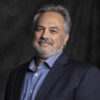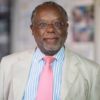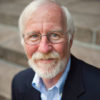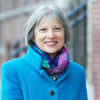As of late afternoon Monday, as panelists at a Northeastern event discussed the ever-growing epidemic of gun violence, there had been 247 mass shootings in the U.S. already this year. It is part of a gruesome trend: From 417 mass shootings in 2019, to 610 the following year, to 692 a year ago. Though they generate extensive reporting by the news media, each event contributes to a dynamic of uncertainty and hopelessness, noted Ted Landsmark, a panelist of “Buffalo Honest, Dallas Honest, Uvalde Honest: Hate, White Supremacy, Guns.”
“I feel as though we’re just at the beginning of trying to figure out why it was that someone in rural South Carolina would drive several hours and then sit in a church basement with a group of people he didn’t know—who were willing to have him join in a prayer meeting—and then shoot and kill them,” said Landsmark, distinguished professor of public policy and urban affairs, and director of the Kitty and Michael Dukakis Center for Urban and Regional Policy. “That’s a kind of sickness that I don’t know that we understand yet.”








